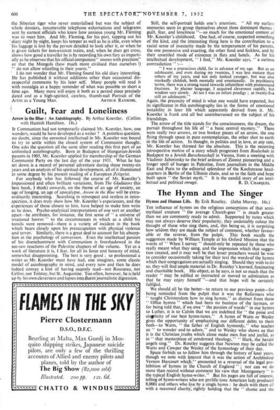Guilt, Fear and Loneliness
IF Communism had not temporarily claimed Mr. Koestler, how, one wonders, would he have developed as a writer ? A pointless question, no doubt, since the unrooted intellectual in Mr. Koestler was bound to try to settle within the closed system of Communist thought. One asks the question all the same after reading this first part of an unfinished autobiography. Born in Budapest of Hungarian-Jewish parents in 1905, Mr. Koestler applied for membership of the German Communist Party on the last day of the year 1931. What he has set down is a record of personal adventure during those twenty-six years and an analysis of his spiritual development, all of it illuminated in some degree by his present reading of a European Zeitgeist.
For anybody who has followed the course of Mr. Koestler's impassioned and often brilliant variations, from The Gladiators (his best book, I think) onwards, on the theme of an age of anxiety, an age of longing, an age of apocalypse, Arrow in the Blue will be extra- ordinarily interesting. Searching in retrospect and restless in intro- spection, it does truly show how Mr. Koestler's experiences, and the experiences of those closest to him, have helped to make him write as he does. Psycho-analytical interpretations of one sort or another apart—he attributes, for instance, the first sense of " a universe of irrational horror " to the circumstances in which as a child his tonsils were removed—there is a variety of incident in the book which bears closely upon his preoccupation with physical violence and terror. Similarly, there is a great deal to account for his absorp- tion in the psychology of conversion. Even the intellectual passion of his disenchantment with Communism is foreshadowed in the see-saw reactions of the Palestine chapters of the volume. Yet as a work of literature it is, I fear, for all its force and honesty of mind, somewhat disappointing. The best is very good ; so professional a writer as Mr. Koestler must have had, one imagines, some classic model of autobiography in mind, and every now and then he does indeed convey a hint of having recently read—not Rousseau, not Cellini, not Tolstoy, but St. Augustine'. Too often, however, he is held up by his own cleverness and lapses intaluent journalistic digression. Still, the self-portrait holds one's attention. " All my earliest memories seem to group themselves about three dominant themes : guilt, fear, and loneliness "—so much for the emotional content of Mr. Koestler's childhood. One had, of course, suspected something of the kind, and the interesting thing here is the contribution to a racial sense of insecurity made by the temperament of his parents, the one possessive and exacting, the other fond and feckless, and by their unsettled Mode of existence in flats and hotels. As for his intellectual development, " I find," Mr. Koestler says, " a curious
contradiction " -
" 1 was a precocious child, far in advance of my age. But as an adolescent, and even during my twenties, I was less mature than others of my years, and not only looked younger, but was also markedly childish, both mentally and emotionally. In psychiatric terms, there was a strong trend towards infantilism with pronounced fixations. In plainer language, I acquired cleverness rapidly, but wisdom very slowly. At ten I was an infant prodigy ; at twenty-five still an adolescent."
Again, the precocity of mind is what one would have expected, but its significance in this autobiography lies in the forms of emotional instability in later life which apparently derived from it. Mr. Koestler is frank and all but unembarrassed on the subject of his friendships.
The arrow of the title stands for the consciousness, the dream, the pursuit throughout his life of " a basic central mystery." There were really two arrows, or two broken pieces of an arrow, the one flying through space in pure contemplatiqn, the other shot to earth in the life of action. In thought, in polities and in love, at any rate, Mr. Koestler has thirsted for the absolute. This is the recurring introspective motive of a story which progresses from Realschule in Budapest to a Jewish Burschenschaft in Vienna, from a meeting with Vladimir Jabotinsky to the brief ardours of Zionist pioneering and a longer spell of hunger in Palestine, from journalism in the Middle East and Paris to the editorial splendour of the Kochstrasse head- quarters in Berlin of the Ullstein chain, and so to the faith and hope built upon " the Soviet myth." It is the candid story of an intel-


































 Previous page
Previous page